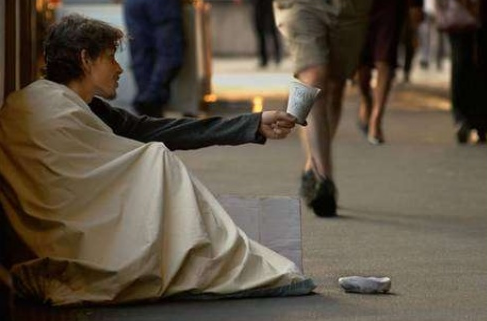The harsh realities of life for Greater Manchester’s poorest households are tracked in a new monitor created by academics at the University of Manchester and published by the Greater Manchester Poverty Action Group (GMPAG).

- A poor homeless man in one of the streets of Britain
The Greater Manchester Poverty monitor brings together data from 18 different sources for the first time, to paint a picture of life for residents – including more than one in four children – living in poverty in Greater Manchester.
Produced by experts at the University and available to the public on the Greater Manchester Poverty Action Group (GMPAG) website, the monitor includes a set of interactive charts and maps and is accompanied by a report detailing experiences of poverty from the perspectives of those affected by it.
The work finds that, on a number of key indicators, the city region lags behind both the North West and England. The evidence also questions traditional beliefs that a job is the quickest route out of poverty, with data showing that in-work poverty is a major problem in parts of the region and efforts to boost economic growth are not being felt evenly across the ten Greater Manchester local authorities.
Key findings brought together in the monitor include:
- Across Greater Manchester local authorities, more than 1 in 4 children, on average, living in poverty in 2013, including 39.3% of children in the city of Manchester.
- 22.6% of households in Greater Manchester claimed housing benefit compared with 19% in England as a whole.
- 9% of the city region’s economically active were unemployed, 3% higher than in 2007.
- 12.1% of Job Seekers Allowance claimants were sanctioned in April 2014, compared with 8.8% nationally.
- Of the ten Greater Manchester authorities, Oldham (18.1%) and Rochdale (18%) had the highest share of working households on low income in 2012.
- Even as the economy started to pick up nationally during 2013, three local authorities – Wigan, Salford and Bolton – saw unemployment rise.
Neil McInroy, chair of the GMPAG said: “Poverty is a scourge and this new monitor and accompanying research tells us it’s not going away. Indeed in some aspects it is getting worse. Some of this is down to central government cuts, but all of us across the public, private and social sectors in Greater Manchester can do more.
Local leaders must make sure that economic growth and job creation are specifically designed to help those living in poverty in the region. We know that the link between economic growth and rising living standards is broken, so we need to do more than just create economic growth for its own sake. We’d like to see a greater emphasis on poverty across Greater Manchester, with the Combined Authority upping the ante on poverty and challenging central government for more powers and resources to tackle it.”
Prof Ruth Lupton, of the University of Manchester, said: “The University of Manchester has a strong commitment to addressing poverty and inequality and making a difference in our city region. We hope that making information about poverty more accessible will ensure that these problems stay at the top of everyone’s agenda.”